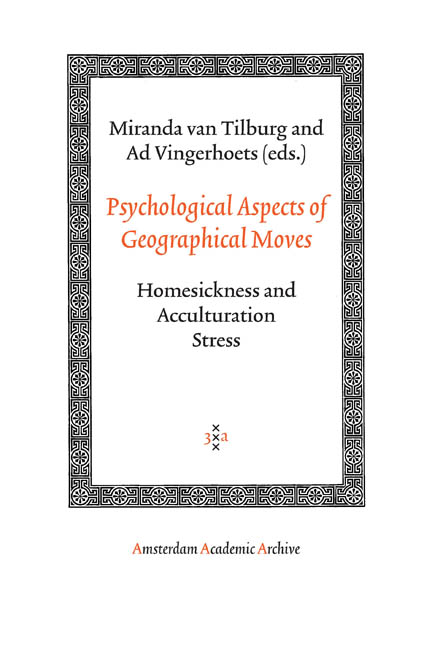Book contents
- Frontmatter
- Preface
- Contents
- Contributors
- 1 The Homesickness Concept: Questions and Doubts
- 2 Culture Shock, Homesickness, and Adaptation to a Foreign Culture
- 3 The Psychological Context of Homesickness
- 4 Geographical Moves and Psychological Adjustment
- 5 Homesickness and Acculturation Stress in the International Student
- 6 Psychological and Psychosocial Adjustment of Migrants: Families in a Changing Environment
- 7 Individual Differences in Acculturative Stress Reactions: Determinants of Homesickness and Psychosocial Maladjustment
- 8 The Cry for the Lost Placenta: Cultural Bereavement and Cultural Survival among Cambodians who Resettled, were Repatriated, or Stayed at Home
- 9 Children's Coping with Homesickness: Phenomenology and Intervention
- 10 Homesickness after Relocation during Early Adolescence
- 11 Personality, Temperament, and Homesickness
- 12 Homesickness, Personality and Personality Disorders: An Overview and Therapeutic Considerations
- 13 Health Issues in International Tourism: The Role of Health Behavior, Stress and Adaptation
- 14 Development of Psychopathology in International Tourists
- Miscellaneous Endmatter
4 - Geographical Moves and Psychological Adjustment
Published online by Cambridge University Press: 23 January 2021
- Frontmatter
- Preface
- Contents
- Contributors
- 1 The Homesickness Concept: Questions and Doubts
- 2 Culture Shock, Homesickness, and Adaptation to a Foreign Culture
- 3 The Psychological Context of Homesickness
- 4 Geographical Moves and Psychological Adjustment
- 5 Homesickness and Acculturation Stress in the International Student
- 6 Psychological and Psychosocial Adjustment of Migrants: Families in a Changing Environment
- 7 Individual Differences in Acculturative Stress Reactions: Determinants of Homesickness and Psychosocial Maladjustment
- 8 The Cry for the Lost Placenta: Cultural Bereavement and Cultural Survival among Cambodians who Resettled, were Repatriated, or Stayed at Home
- 9 Children's Coping with Homesickness: Phenomenology and Intervention
- 10 Homesickness after Relocation during Early Adolescence
- 11 Personality, Temperament, and Homesickness
- 12 Homesickness, Personality and Personality Disorders: An Overview and Therapeutic Considerations
- 13 Health Issues in International Tourism: The Role of Health Behavior, Stress and Adaptation
- 14 Development of Psychopathology in International Tourists
- Miscellaneous Endmatter
Summary
Background
Research on geographical moves has been evident since the turn of the century when large population movements occurred for various reasons. Immigration between countries was stimulated by changes in agricultural and industrial conditions and generally the populations involved sought to better their predicaments. Research carried out on these populations however, indicated that geographical transitions were stressful and likely to increase the risk of changes in mental or physical health. What was never clear was whether there is self-selection into moves, which favors all those relatively at risk for ill health. Studies identified the vulnerability of those who chose to move either within or between countries. In the case of migrants for example, Odegaard (1932) reported greater rates of hospital admissions for mental disorder amongst Norwegian migrants to Minnesota in the U.S.A. than for either the natives of either Norway or Minnesota.
General effects of relocation evident from statistics provide unclear indications of underlying mechanisms. Also, there were some contradictions. For example, Kleiner and Parker (1963) demonstrated the greater prevalence of psychoneurotic and neurotic symptoms in native born individuals migrating within the U.S.A. Circumstantial factors such as educational backgrounds, achievement level and the degree of planning for moves appears to be involved.
Moves and mental health
Clearly, research, which identifies the effects of moves in specific contexts, is more likely to provide specific details on the personal reaction of people to moves. Faris and Dunham (1939) provided an attempt to identify specific effects. Using home ownership as an index of personal stability and rental status as an index of mobility, they reported significant negative correlations between mobility and ill health. However, the causal direction is complex, lack of ability to cope with new conditions may create poverty and social drift down to social disorganization and resulting mental ill health.
Physical ill health, cardiovascular disease, gastric disorders and infectious illness such as tuberculosis, have been identified as more prevalent in migrant populations (see Medalie & Kahn, 1973; Cruze-Coke et al., 1964; Wolff, 1953; Christenson & Hinkle, 1961). However, self-selection of those who move cannot be precluded.
- Type
- Chapter
- Information
- Psychological Aspects of Geographical MovesHomesickness and Acculturation Stress, pp. 49 - 62Publisher: Amsterdam University PressPrint publication year: 2006

